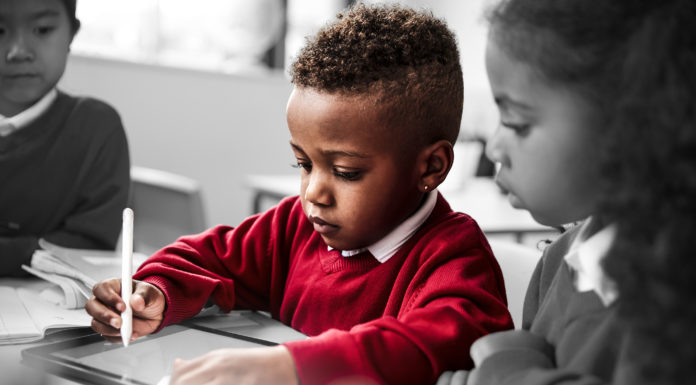If you take the coronavirus (COVID-19) pandemic, add the massive black-white wealth gap, and then mix in America’s ungodly lack of social safety nets; black families are about to be served a hellacious helping of hurt.
Schools are closed for more than 55 million students in America for several weeks, layoffs are widespread, and the coronavirus crisis has the economy in a chokehold. The squeeze is going to be painful for black families, particularly with our children’s education. Yet, we have good reason not to sulk or succumb:
Black families’ legacy in the education system is one of resilience and innovation in response to crisis and turmoil.
It is unprecedented to see 124,000 schools closed abruptly in America with families scrambling to figure out what comes next for their children. Yet, as unexpected and unbelievable as this COVID-19 fallout is, education for black students has been in crisis long before this virus.
The School System Was Never Meant For Us
America’s schools were never designed for black children. It’s no mistake that black students don’t have access to black educators, that their classrooms aren’t culturally responsive, that their curriculum erases black excellence, that they are shut out of advanced courses and gifted programs, and their school districts receive $23 billion less than predominantly white districts to serve the same number of students. The empty feeling all students are experiencing now as they are blocked from classrooms, from prom, and from connecting with the teachers they know and love is a small taste of what it feels like on a daily basis for black students to be in schools that lock them out from their history, teachers that look like them, their culture and their community.
But for black students’ ongoing educational crisis, there are no massive bailouts in sight. There has been no race to make resources—from curriculum to computers to connectivity— accessible. And there has been a resistance to breaking the rigidity that prevents schools from catering to the unique needs of black students. So black families have had to innovate, create, workaround, experiment, and all-out fend for themselves in our education system.
In 1961, when more than 100 black high school students were expelled from school for their activism, black leaders created “Nonviolent High” to teach those students math, science, and history. Three years later, Freedom Schools grew out of this black response to racist circumstances. Since then, it seems like we have tried everything.
Black Families Have Always Found Ways to Rise Above a Broken System
We have put our hopes in our neighborhood schools.
We’ve tried our version of “distance learning” where our children live with a relative so they can access better schools.
We’ve used someone’s address to get into better schools.
We’ve patronized parochial schools.
We’ve created charter schools like the Harlem Children’s Zone and Urban Prep Academies.
We’ve created hybrid schools like Lebron James’ I Promise Academy.
We’ve created programs outside of school, like TeenSHARP, a college preparatory organization I co-founded, to meet needs the school system has failed to address.
And black families are homeschooling at increasing rates.
Coronavirus has upended our education system and forced families of all races and socioeconomic backgrounds to explore and adjust. But black families have always been on an intense search for alternatives that is necessitated by an education system that thrusts tradeoffs and turmoil on us.
This Pandemic Is a Time to Learn and Adapt
We have had to choose the neighborhood school that is good on proximity and tradition but lacking in rigor and resources. We lotteried our way into a charter school that is strong on safety and academics but rote and restrictive. Or we broke our budget to have our child attend the private school that is full of opportunity and access to privilege but thin on diversity and inclusivity. Necessity is the mother of invention and at this time of utter disruption, it is time to dig into our wellspring of creativity.
This might mean black families weather this storm, and emerge stronger on the other side, by leveraging our intergenerational and interdependent inclinations. Black families are among the most likely groups to live in multi-generational households. We also have a long history of creating cooperatives and mutual aid societies. Like Sugata Mitra’s “granny clouds,” there are ways we can engage literal and fictive grandparents to keep our children sharp while learning at home. We can also look to black homeschool cooperatives like WorldSchool Mosaic and Kullan Village Homeschool Co-op for lessons for educating our children in collaboration with other families.
We should capitalize on this moment to foster in our children an even greater appetite for curriculum that affirm their identity and interests. We can draw insights for how to approach this from Freedom Schools all across the country, from early childhood centers such as Little Sun People, through resources provided by the Southern Poverty Law Center’s Teaching Tolerance website, and from schools like Little Black Pearl Academy where students in Chicago learn sneaker design and the business of art.
With the entire education system in flux over the next several months, we are all going to learn a great deal about what is possible in our education system and our own potential. We’ll grapple with what is essential while reflecting on our role and power in the schooling of our children.
It’s not going to be easy but I’m excited to see how black families turn this time of unexpected self-quarantine into a springboard for unfettered self-determination.










